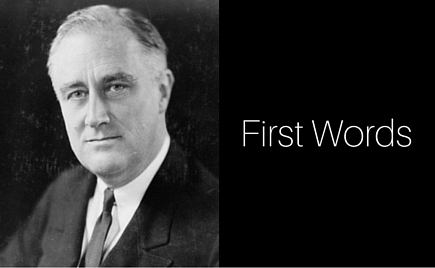First Words: Franklin Roosevelt, March 4, 1933
 Library of Congress
Library of Congress
In this ongoing series, the Miller Center’s First Year Project looks at key passages from past inaugural addresses—the first words spoken by our new presidents. Today we look at the last president to take the oath of office on March 4, Franklin Delano Roosevelt.
When Franklin Delano Roosevelt took the oath of office as our 32nd president, he was confronted by the Great Depression, the worst economic downturn in our nation's history. As Governor of New York from 1928–1932, Roosevelt had first taken a cautious approach to the depression, hoping that the economy would turn around. When it did not, FDR determined that "there is a duty on the part of government to do something about this." He supported lower taxes for farmers and urged the state to develop public power utilities. As the depression deepened, he got the New York state legislature to pass a public works program for the unemployed and to grant relief to the needy. All of these actions established FDR's credentials as a liberal reformer, and in his first speech to the nation as president, he likened the depression to a foreign enemy.
This is preeminently the time to speak the truth, the whole truth, frankly and boldly. Nor need we shrink from honestly facing conditions in our country today. This great Nation will endure as it has endured, will revive and will prosper. So, first of all, let me assert my firm belief that the only thing we have to fear is fear itself—nameless, unreasoning, unjustified terror which paralyzes needed efforts to convert retreat into advance. In every dark hour of our national life a leadership of frankness and vigor has met with that understanding and support of the people themselves which is essential to victory. I am convinced that you will again give that support to leadership in these critical days.
. . .
Our greatest primary task is to put people to work. This is no unsolvable problem if we face it wisely and courageously. It can be accomplished in part by direct recruiting by the Government itself, treating the task as we would treat the emergency of a war, but at the same time, through this employment, accomplishing greatly needed projects to stimulate and reorganize the use of our natural resources.
. . .
If I read the temper of our people correctly, we now realize as we have never realized before our interdependence on each other; that we cannot merely take but we must give as well; that if we are to go forward, we must move as a trained and loyal army willing to sacrifice for the good of a common discipline, because without such discipline no progress is made, no leadership becomes effective.